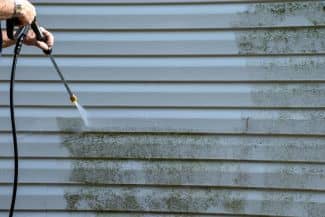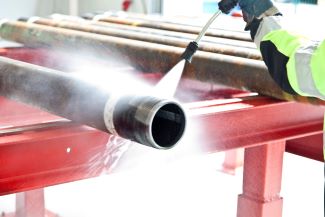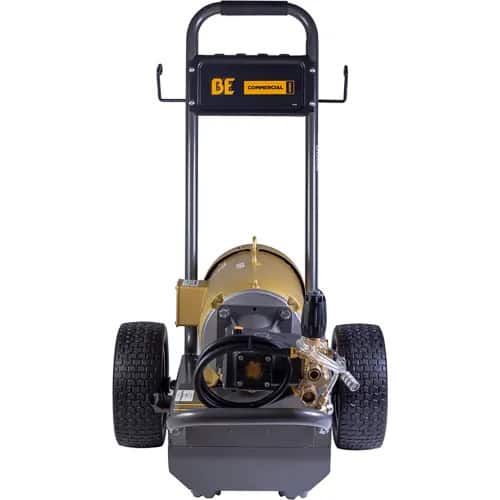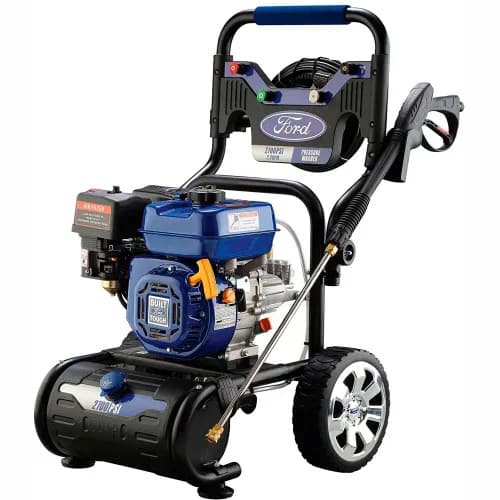Whether you need high pressure cleaners day in, day out for a business or commercial setting, or you just need something for occasional use like cleaning a company vehicle or sprucing up the entrance to your facility, everyone can use the speed and efficiency of a power washer.
While there are several different kinds of pressure washer available, with a host of different uses, accessories, and applications, it’s good to know just how a pressure washer works. And while the initial outlay for a washer can vary greatly in price, you really do get what you pay for. So if you need a machine built for the daily grind, rather than occasional cleaning, a higher initial upfront investment is going to pay off in the long run.
Unpacking the Basics of a Pressure Washer
Before we dive into the kinds of pressure washers available, and the best pressure washer for each job, let's take a look into the workings of pressure washers.
At its core, a pressure washer is a simple machine with the water pump as its heart. This pump draws water from your regular supply, and its motor powers up to generate a forceful spray. Regardless of whether your pressure washer has an electric or gas motor, its job is to accelerate the water to high pressure and release it with force, giving you maximum cleaning power.
The Water Pump
Driven by the pressure washer's motor, the pump draws water from a source (like a garden hose) and expels it through a high-pressure hose. The spray gun's trigger controls the water release for efficient use and safety, ensuring water only sprays when the trigger is depressed. As water can leave the hose-end at very high pressure, controlling this aspect of the machine is paramount.
The Role of the Motor
Quite simply, the motor fuels the pump. The better the motor, the greater the cleaning quality of the washer itself. Electric pressure washers, which run on electricity, are ideal for indoor or residential use, being emission-free and quieter. On the other hand, gas motors offer greater power and mobility, suitable for heavy-duty cleaning tasks. The motor you opt for will depend on your specific cleaning requirements and the washer's usage area.
Understanding PSI, GPM and CU.
Regardless of the kind of pressure washer you need (residential or commercial, gas or electric), there are a few terms you need to know when you’re selecting your machine.
PSI - Pounds per Square Inch
This is basically an indication of the kind of power your pressure washer has. THe higher the PSI, the greater the water force coming out of the nozzle. Now you may be tempted to just go straight to the highest possible PSI available, but that can be a mistake. You don’t want to bring extreme forces to delicate surfaces such as wood. Here are the ranges you can generally expect to find:
- Light Duty: 0-1999 PSI (residential/delicate cleaning)
- Medium Duty: 2000-2799 PSI
- Heavy Duty: 2800-3299 PSI
- Industrial Duty: 3300+ PSI
GPM - Gallons Per Minute
If PSI is your power indicator, GPM is your volume. It’s no good having seriously-high pressure if you’re hindered by the amount of cleaning you can do in a set time. So you need to cross-reference the PSI with the GPM to see if you’re getting the value of cleaning done that you need to. And that calculation is what we refer to as the CU, or Cleaning Units. The higher the CU, the greater the power and volume your pressure washer can deliver.
Residential vs Industrial Pressure Washers
When buying a pressure washer, you'll encounter two primary categories: residential and commercial. Each one has its own strengths and you’ll need to keep that in mind when considering the cleaning jobs in front of you.
On the whole, residential pressure washers are not as powerful as commercial washers, and this is intentional. The trade-off here is for a quieter performance so that you can wash the car or patio without splitting the eardrums of your neighbors on a Sunday morning. And honestly, you don’t want to go too powerful on items around the home, that could be destructive.
However, noise isn’t usually a factor in a commercial setting. In that case, you will have a much more aggressive pressure washer that has superior cleaning power, and while it may require the use of ear protection, the results will sparkle. Let’s take a closer look at applications for each kind:
TYPES OF SHELVING UNITS

Residential Pressure Washers
Residential pressure washers, designed for home use, are typically more compact, lightweight, and maneuverable than their commercial counterparts. They're ideal for cleaning driveways, washing cars, or removing patio dirt. With their quieter, eco-friendly electric motors, they may not be as powerful as commercial models, but they're perfect for tackling common household cleaning tasks. However, if you’re not concerned with a quieter model and instead want greater cleaning power, commercial machines are the way forward.

Industrial Pressure Washers
Industrial pressure washers, however, are built for larger, more demanding tasks like cleaning large parking lots, commercial buildings, or construction sites. Their more powerful motors and higher flow rates enable them to clean larger areas quickly. Since many are gas-powered, they're flexible to operate in places without electricity access. They also come equipped with high-performance attachments and features for tackling tough dirt and grime.
Hot Water Pressure Washers
These models stand out from regular ones due to their unique ability to handle heavy-duty cleaning tasks. Unlike ordinary pressure washers that use cold water, these specialized machines heat the water before dispersing it, significantly improving their efficiency against stubborn, greasy, or oily stains. After drawing water from a source, the machine's built-in heating element increases the water's temperature, typically between 130 and 155 degrees Fahrenheit. The hot water then gets pressurized and expelled through the cleaning attachment, providing an effective cleaning force.
A hot water pressure washer excels at breaking down and removing oily or greasy stains. The hot water softens and dissolves these substances, making them easy to wash away. More than just cleaning, these machines also effectively kill bacteria and other germs, becoming an excellent choice for areas needing thorough sanitization.
What’s more, hot water pressure washers are so powerful and efficient that you can use them without any chemicals or cleaning solutions and still get an excellent, sparkling result. If you’re concerned about your eco footprint or have concerns about chemicals (think schools, animals etc.) then this model is ideal for you.
GAS VS ELECTRIC PRESSURE WASHERS

ELECTRIC PRESSURE WASHERS
The best electric pressure washers are excellent for smaller businesses and residential cleaning tasks. Operating on electricity, these models are usually more lightweight and produce less noise compared to those powered by gas. They're perfect for cleaning tasks like washing cars, outdoor furniture, or small patios. Electric pressure washers start with a button push, making them user-friendly. With no emissions, they are safe for indoor use, such as in a warehouse or garage. You can also find small pressure washers in this category, which are portable and battery powered).
Electric pressure washers require less maintenance, with no need to change oil or worry about fuel. They're more compact and easier to store. However, their dependence on electricity (either from an outlet or a battery power washer) can limit their mobility. Additionally, running an electric pressure washer for extended periods can lead to overheating.

GAS PRESSURE WASHERS
Gas pressure washers, the titans of the pressure washer family, are designed to handle large, challenging tasks like cleaning decks, driveways, or entire facilities (both inside and out). These washers run on combustion engines, powered by either gasoline or diesel fuel. Their high pressure and water flow rate make them efficient for big cleaning jobs and are therefore superbly suited to commercial applications.
Gas pressure washers are mobile, not reliant on a power outlet, and can clean large areas without the worry of extension cords. These portable pressure washers can also operate for long periods without overheating, ideal for extended cleaning sessions. This makes them perfect for cleaning construction vehicles that get caked with mud and debris.
However, they are generally heavier and noisier than their electric counterparts and require regular maintenance, such as oil changes and spark plug replacements. But it’s a small price to pay for such a heavy-duty cleaning machine.
Useful Pressure Washer Attachments
Pressure washers come with a variety of cleaning attachments that can be connected to the high-pressure hose. These attachments, such as a rotary brush for patios or driveways and a jet spray nozzle for stubborn grime or mildew, enhance the washer's versatility, making it a comprehensive solution for outdoor cleaning tasks. You’ll find a whole arsenal of cleaning attachments right here.
What Kinds of Cleaners, Solutions and Soaps should I Use?
Well, what cleaning challenges are you facing? In some cases, the pure power of a commercial pressure washer will get the job done. Sometimes you may need cleaning solutions that are pet and child friendly, especially around education facilities and parks. In industrial settings with stubborn grime, including graffiti, paint and ground-in dirt, stronger chemicals will be required to shift the stain. But whether you need solutions designed just for floors and driveways, brick and concrete walls, wooden finishes, or plastic and glass, you’ll find the ideal soaps and concentrates to get the job done.
So, what are you looking for? Big power and volume for major industrial cleaning jobs, or soothing smaller for occasional duties? Whatever it is, you’ll find the best washers for the job at Global Industrial. And if you can’t quite find what you need, don’t worry. We’re always here to answer your questions and deliver the cleaning goods.
The information contained in this article is for informational, educational, and promotional purposes only and is based on information available as of the initial date of publication. It is the reader’s responsibility to ensure compliance with all applicable laws, rules, codes and regulations. If there is any question or doubt in regard to any element contained in this article, please consult a licensed professional. Under no circumstances will Global Industrial® be liable for any loss or damage caused by your reliance on this article.